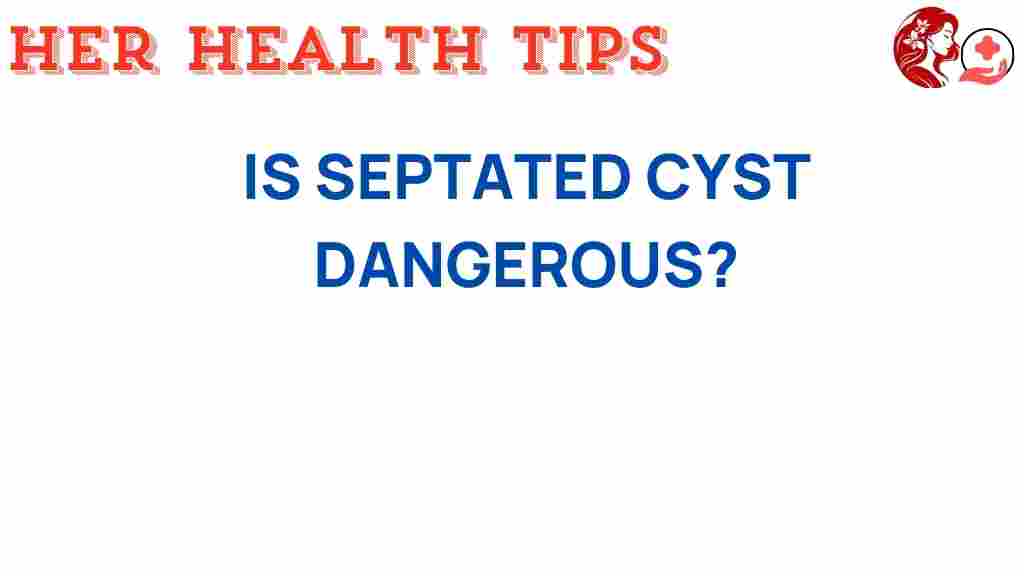Unraveling the Mystery: Is a Septated Cyst Dangerous?
When it comes to health concerns, a diagnosis of a septated cyst can often lead to a flurry of questions and anxiety. What exactly is a septated cyst? How does it differ from a simple cyst? Are there any associated health risks? Understanding the nature of septated cysts is crucial for managing your health effectively. In this article, we will discuss the symptoms, imaging techniques, diagnosis, treatment options, and the importance of seeking medical advice regarding septated cysts.
What is a Septated Cyst?
A septated cyst is a fluid-filled sac that contains one or more internal divisions, known as septa. These septa can vary in thickness and may indicate different underlying conditions. Septated cysts can develop in various parts of the body, including the ovaries, kidneys, and liver. Unlike simple cysts, which have smooth walls and are often benign, septated cysts may carry a higher risk of complications and should be evaluated carefully.
Symptoms of Septated Cysts
Many individuals with a septated cyst may not experience noticeable symptoms, especially if the cyst is small. However, symptoms can arise depending on the cyst’s size, location, and whether it causes any complications. Common symptoms include:
- Abdominal or pelvic pain
- Swelling or bloating
- Nausea or vomiting
- Changes in urinary habits
- Irregular menstrual cycles (in females)
If you experience any of these symptoms, it is essential to consult a healthcare professional for proper evaluation.
Imaging Techniques for Diagnosis
To diagnose a septated cyst, healthcare providers typically rely on imaging techniques. These methods help visualize the cyst and determine its characteristics. Common imaging techniques include:
- Ultrasound: This is often the first imaging test performed. It uses sound waves to create images of the cyst and can help distinguish between simple and septated cysts.
- CT Scan: A computed tomography scan provides a more detailed image of the cyst and surrounding structures. It is particularly useful for evaluating cysts in the abdomen and pelvis.
- MRI: Magnetic resonance imaging can offer additional information about the cyst’s composition and any tissue involvement.
These imaging techniques help healthcare providers assess the cyst’s nature and make informed decisions about management.
Health Risks Associated with Septated Cysts
While many septated cysts are benign, some may pose health risks. The presence of septa within a cyst can be indicative of more serious conditions, including:
- Infection: Septated cysts can become infected, leading to abscess formation and requiring prompt treatment.
- Rupture: If a cyst grows too large, it may rupture, causing severe pain and potential internal bleeding.
- Malignancy: In some cases, septated cysts can be associated with tumors, including ovarian cancer. Therefore, further evaluation is crucial.
It’s essential to have regular follow-ups and imaging studies to monitor the cyst’s behavior over time.
Diagnosis of Septated Cysts
Diagnosing a septated cyst involves a comprehensive approach, including:
- Medical History: Your doctor will review your medical history and any symptoms you may have.
- Physical Examination: A physical exam can provide additional clues regarding possible cyst complications.
- Imaging Tests: As previously mentioned, ultrasound, CT scans, or MRIs are key in diagnosing septated cysts.
- Lab Tests: Blood tests may be conducted to check for markers that could indicate malignancy or infection.
Once diagnosed, the healthcare provider can discuss the best course of action based on the cyst’s characteristics.
Treatment Options for Septated Cysts
The treatment for a septated cyst depends on several factors, including the cyst’s size, location, symptoms, and underlying cause. Here are some common treatment options:
- Monitoring: If the cyst is small and asymptomatic, your doctor may recommend regular monitoring with follow-up imaging to track any changes.
- Medications: If there is an infection, antibiotics may be prescribed. Pain relief medications can also help manage discomfort.
- Surgical Intervention: If the cyst is large, symptomatic, or has suspicious features, surgical removal may be necessary. This can typically be done laparoscopically, minimizing recovery time.
Always discuss your treatment options with your healthcare provider to determine the best course of action based on your specific situation.
When to Seek Medical Advice
If you suspect you have a septated cyst or are experiencing symptoms, it is crucial to seek medical advice. Early diagnosis and intervention can prevent complications. Here are some situations in which you should consult a healthcare professional:
- Severe abdominal or pelvic pain
- Sudden changes in urinary or bowel habits
- Persistent nausea or vomiting
- Unexplained weight loss or changes in appetite
- Symptoms that worsen over time
Being proactive about your health can lead to better outcomes and peace of mind.
Troubleshooting Tips for Managing Septated Cysts
Managing a septated cyst can be daunting, but there are ways to cope with the uncertainty. Here are some tips:
- Stay Informed: Understanding your condition can help reduce anxiety. Ask your healthcare provider questions and seek reputable sources of information.
- Follow-Up Appointments: Regular follow-ups and imaging studies are essential for monitoring the cyst’s behavior.
- Healthy Lifestyle: Maintain a balanced diet and engage in regular exercise to support overall health.
- Support Systems: Connect with support groups or counseling services if you feel overwhelmed.
By taking proactive steps, you can manage your health more effectively and reduce stress related to your diagnosis.
Conclusion
In conclusion, a diagnosis of a septated cyst can raise valid concerns about potential health risks. However, with appropriate diagnostic imaging, timely medical advice, and a tailored treatment plan, many individuals can manage their condition effectively. Always consult your healthcare provider for personalized advice and follow-up care. Remember, knowledge is power when it comes to health, and being proactive can lead to better outcomes.
For more information on cysts and other health conditions, visit Healthline.
If you are looking for support or further reading on managing cysts, check out our resource page here.
This article is in the category Conditions and created by HerHealthTips Team
